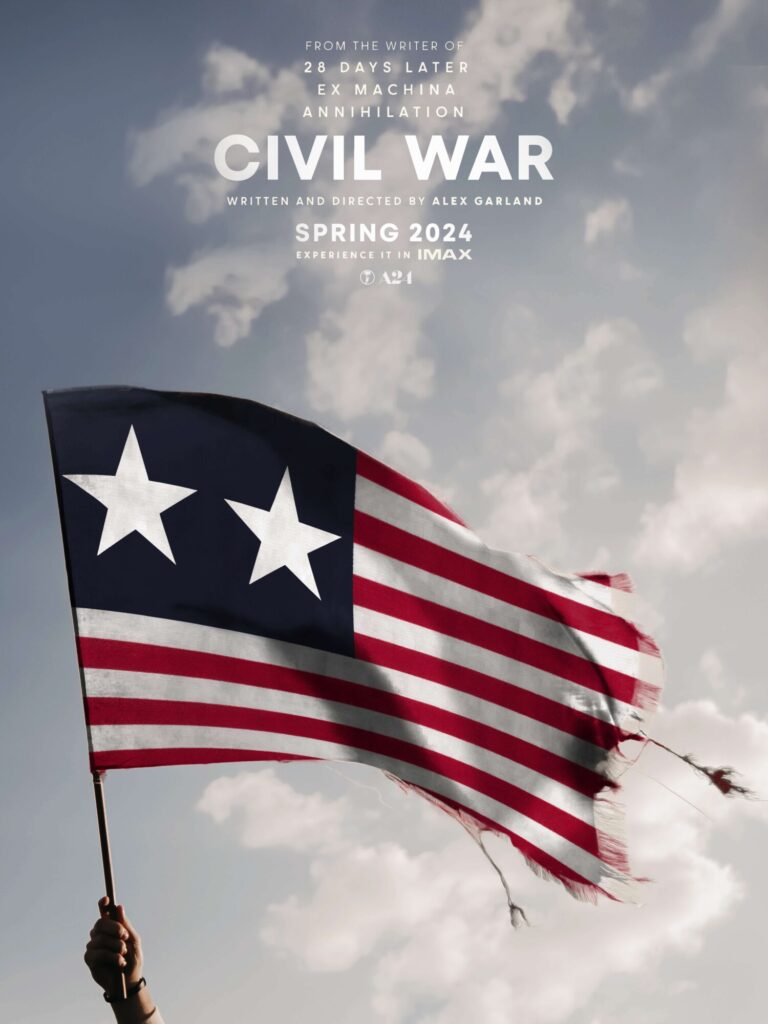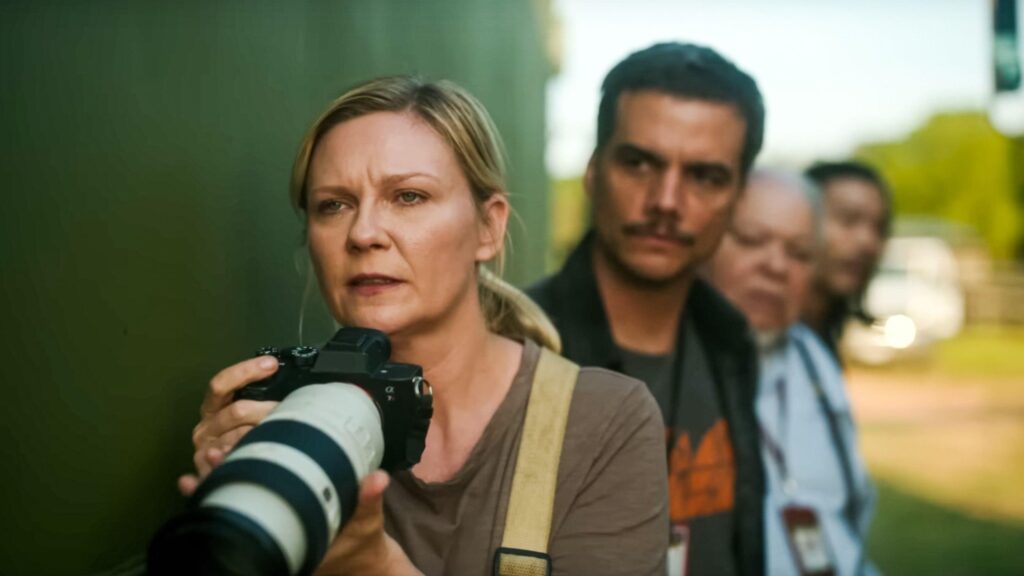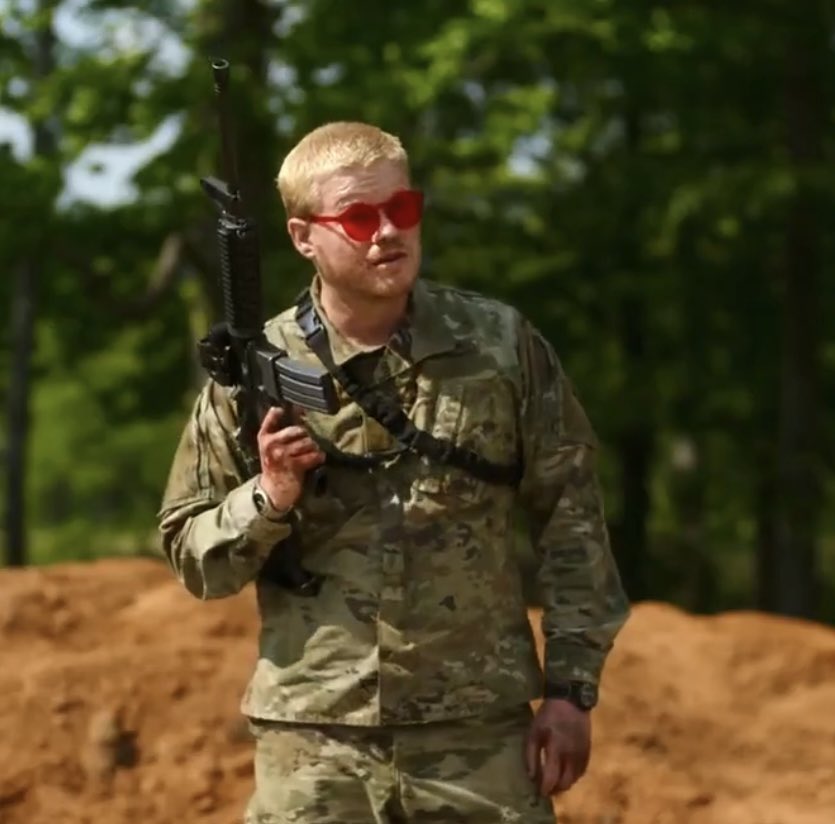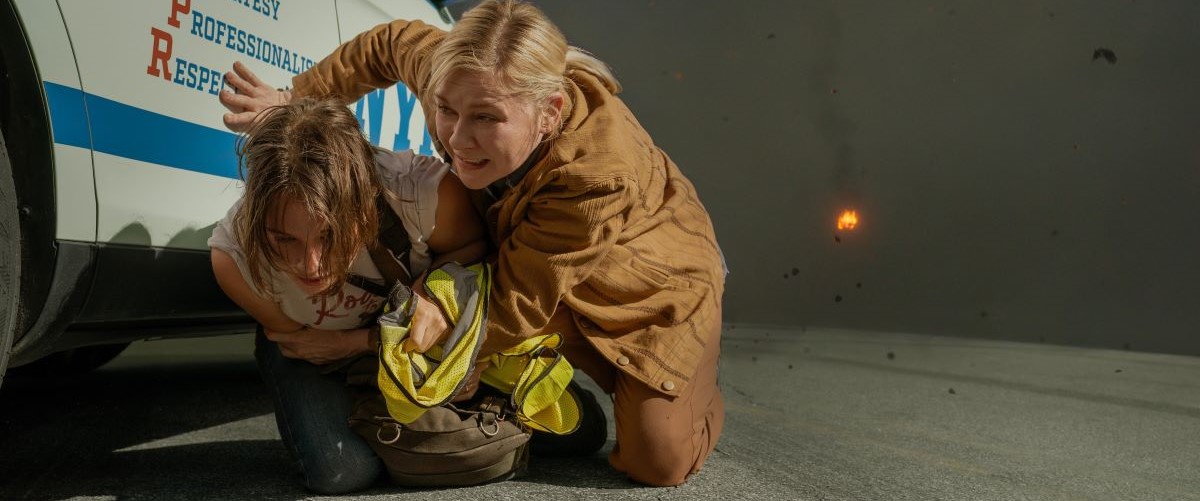Review by Tim Robins

Civil War (not to be confused with Captain America: Civil War) is an involving war drama set in an America torn apart by various factions – for the most part conflicting coalitions between various States with suggestions of racial tensions – and a violent debate around who is and is not to be considered a true American.
Alex Garland – writer of 28 Days Later (2002) and Dredd (2012) and writer/director of Ex Machina (2014) and Annihilation (2018) – delivers a tense, visceral movie, focussing on a group of war photographers on a dangerous road trip to Washington DC. Their aim – to capture the last moments of the besieged, Trump-like President played by Nick Offerman, who seems to be the go to actor for all things MAGA.
Civil War is not a political satire of today’s divided America, although it is an implicitly political backdrop. We meet a couple of violent militia members who appear to have been carrying out their own ethnic cleansing and our ‘heroine’, Lee Smith (Kirsten Dunst), has made her name with photos of the “ANITFA” massacre.

You might get caught up wondering if ANTIFA were the victims or perpetrators of the massacre, but don’t bother. Although, in reality, there certainly are ANTIFA flags and people do identify with certain shared beliefs, it for the most part functions as a bogey man for Trumpists. And Garland has explicitly expressed concern about the current rise in fascism, even if this isn’t dramatised in his film.
That said, Garland been accused of “both-side-ism”. In interviews, the director has come out against what he describes as “The Far Left” and “The Far Right” and is against polarisation. Certainly, in terms of rhetoric, it can be hard to distinguish between Trump’s grotesque fantasy of babies being executed after birth and the imagery of leftist commentary whose YouTube channels carry headlines such as “Trump EXPLODES!”, “Unhinged caller EXPLODES!”, “MAGA Realise They’re Killing themselves” and “Project 2025 Goes Nuclear!”
At best, what the film dramatises is the anger that appears to permeate American politics, as can’t-we-all-be-nice-to-each-other-Liberals try to work out how to engage with an unholy Right Wing coalition of Christian Fundamentalists, and those billionaires who have decided that democracy isn’t allowing them to realise their most fevered dreams of wealth and power and that maybe an authoritarian leader exemplified by (of all people) Hitler had the right idea.
Garland just doesn’t want to get into specifics. But let me provide Garland with the clarity the film lacks: opposing Nazism and violations of Human Rights is not “Far Left”.
In the absence of a clear political one the only side that we are left cheering for is the photographers. In an interview, Garland has said, “I think serious journalism needs protecting, because it’s under attack, so I wanted to make those people ‘heroes’ to put them front and centre.”
Young would-be war photographer Jessie Cullen (Cailee Spaeny) aspires to be like her idol, Smith. This provides a story arc as we see Culen moving from terrified wannabe to numbed professional. But why do the photographers want to put themselves in active war zones? Is it just to take dramatic photographs? I think that would be the answer for Garland because the violence here is often highly stylised. Don’t ask why the trees are on fire, just sit back in the beauty of the sparks swirling around like amber, glowing fireflies.

Civil War is a road trip through a landscape familiar from zombie apocalypse movies – miles of burnt-out cars on a freeway, ironic locations such as an abandoned Winter Wonderland, now a kill zone for some unseen sniper. Even a stop at a gas station is a moment of terror. Here, Garland really trowels on the sexual threat to the young Jessie. I am that much of a chauvinist that I sat aghast wondering what the hell the male photo-journalists were doing, letting her wander off with a lairy yokel stalking not far behind. The scene is entirely exploitative.
There is little consideration of the ethics of photojournalism and not much self-awareness among the on-screen photojournalists. The film glamourises the occupation as risking, all to provide a neutral record of the war and leaving questions to others. Garland thinks he is challenging the way journalists are represented in cinema. He isn’t. Although Civil War is of a piece with films such as Salvador (1986) and The Killing Fields (1984).
Garland participates in an established view of war photographers as heroically reporting reality. But, these days, people are aware of the selectivity or down right fakery behind many famous war photographs.

Also, the current culture of hostility toward all authority means photographs are immediately suspected as lies. Reactions to photographs of the recent eclipse are exemplary in this respect. So I was left wondering: what is the audience for the journalist’s photographs? How the photographs will be used and interpreted is also left out of the film.
The most plausible scene is set in the lounge bar of a hotel, where the journalists hang around getting drunk or stoned or drunk and stoned. It is here we meet other photographers we will follow throughout the film, including Joel (Wagner Moura) and Sammy (Stephen McKinley Henderson). The motley crew echoes the kind of survivors found in films such as The World, The Flesh and the Devil (1959), in which characters represent a microcosm of contemporary society.
Back in the lounge bar, I was reminded of Mark Pedelty’s book War Stories: The Culture of Foreign Correspondents. Living among war reporters, the author argues that it is a myth that war is reported from the front lines. More often than not, war is reported from a paper’s front office, or the relative safety of hotels where journalists sit around waiting for something “big” to happen and to be escorted to accessible and already safe sites of past atrocities. Civil War does nothing to dispel the myth of the photojournalist as a war hero.
I am not surprised that people have left Civil War feeling shaken and even claiming to suffer from Post Traumatic Stress Disorder. Frankly, I felt embattled throughout. The film’s politics exudes a negative energy – tension, fear, worry – but is so undeveloped these feelings really have nowhere to go. I suggest that you direct them at Alex Garland.
Tim Robins
• Civil War is in cinemas now
A freelance journalist and Doctor Who fanzine editor since 1978, Tim Robins has written on comics, films, books and TV programmes for a wide range of publications including Starburst, Interzone, Primetime and TV Guide.
His brief flirtation with comics includes ghost inking a 2000AD strip and co-writing a Doctor Who strip with Mike Collins. Since 1990 he worked at the University of Glamorgan where he was a Senior Lecturer in Cultural and Media Studies and the social sciences. Academically, he has published on the animation industry in Wales and approaches to social memory. He claims to be a card carrying member of the Politically Correct, a secret cadre bent on ruling the entire world and all human thought.
Categories: Features, Film, Other Worlds, Reviews
 In Review: Twisters
In Review: Twisters  In Review: Kingdom of the Planet of the Apes
In Review: Kingdom of the Planet of the Apes  In Review: Rebel Moon Part 2 – The Scargiver
In Review: Rebel Moon Part 2 – The Scargiver  In Review: Godzilla x Kong: The New Empire
In Review: Godzilla x Kong: The New Empire
In the mid-90s, a photographer colleague in lowly Peterborough was impressed that his nephew’s friend had completed his first novel. I was cynical, as the colleague was unable to confirm whether the friend had a publisher, or not.
The nephew was/is Layo Paskin of British DJ duo Layo & Bushwacka!; the friend was Alex Garland; and the novel was ‘The Beach’, causing me to tread more respectfully in future.